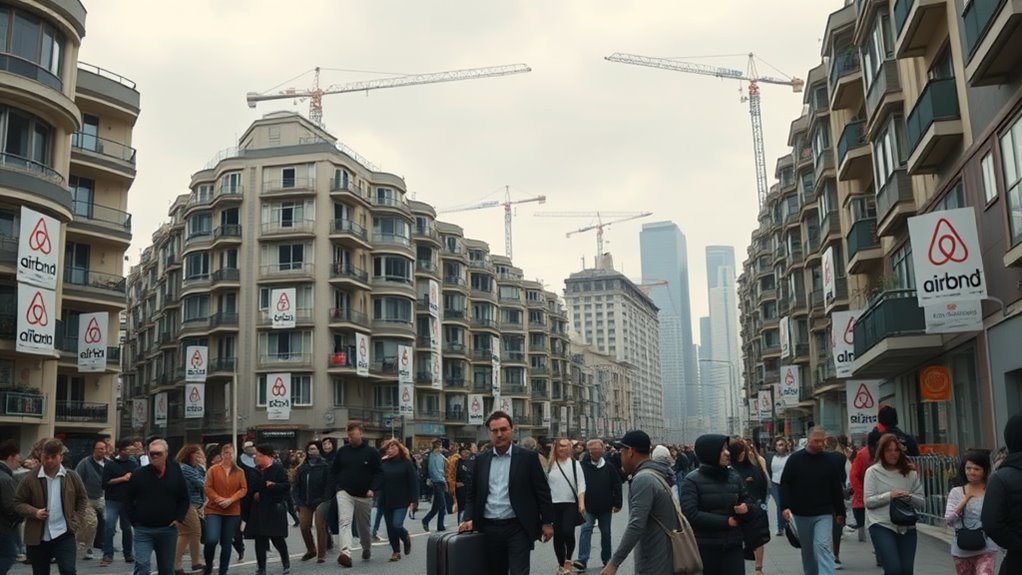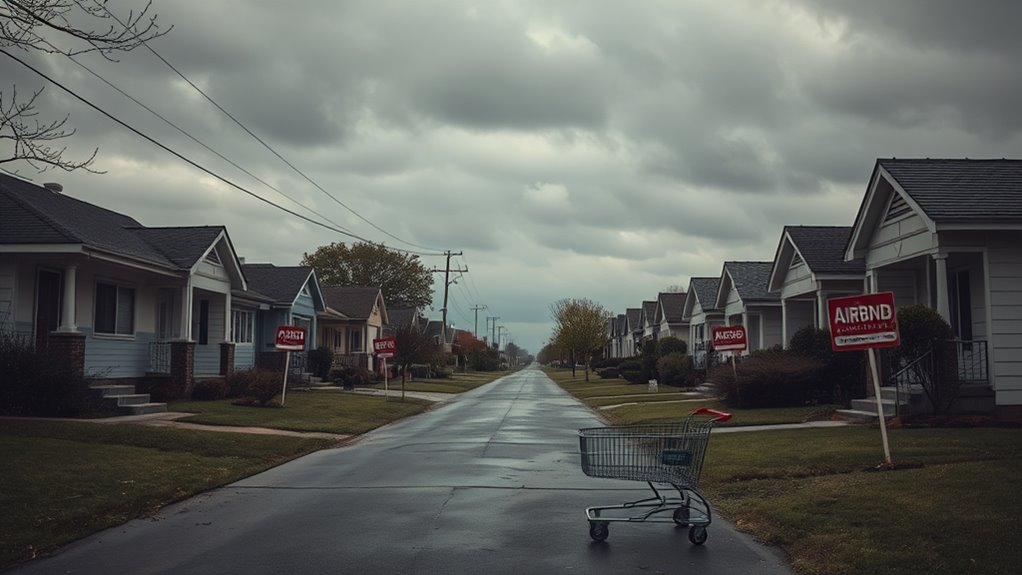Investing in Airbnb now requires a down payment of at least 10%, often 25%, which strains cash reserves. The market is oversaturated with 1.38 million U.S. listings, driving competition and lowering nightly rates. Most hosts earn less than $500 monthly, far below expectations. Seasonal fluctuations and economic downturns make income unpredictable, while high maintenance costs and guest turnover add financial pressure. Regulatory risks further disrupt operations. Discovering the full scope of challenges could reshape your perspective.
Key Takeaways
- High competition makes consistent bookings difficult, driving down nightly rates and squeezing profitability.
- Only 10% of Airbnb hosts earn over $2,000 monthly, with many making less than $500.
- Unpredictable income streams due to seasonal fluctuations and economic downturns disrupt steady rental income.
- Property management challenges include enforcing house rules, guest issues, and potential listing suspensions.
- High upfront costs, maintenance, and operating expenses can outweigh potential earnings.
Higher Down Payment Requirements
Vacation rental properties often demand a down payment of at least 10%, with many lenders requiring 25% or more. This higher down payment translates to a considerable initial cash investment that can strain your finances. Unlike traditional residential properties, the upfront costs are markedly steeper, forcing you to allocate more capital upfront. Financial institutions often perceive vacation rentals as riskier investments, justifying these stringent requirements. If you don’t have robust cash reserves, this financial strain can hinder your ability to cover other expenses or unexpected emergencies. Even with a strong application, you’re unlikely to avoid these considerable upfront costs entirely. Failing to account for this high initial investment can lead to challenges, especially if your property’s income underperforms. The higher down payment also limits liquidity, making it harder to diversify your investments. Before committing, assess whether you’re prepared to handle this financial burden without compromising your overall financial stability.
Limited Control Over Property and Listings
You can’t fully enforce house rules with guests, which increases the risk of property damage and liability. Airbnb can suspend or remove your listing without warning, cutting off your income stream overnight. Even minor disputes or regulatory changes can lead to account suspension, leaving you powerless to manage your property effectively.
Guest Rule Enforcement
While Airbnb provides a platform for property rentals, hosts often face significant challenges in enforcing guest rules, leading to potential risks. You’ll discover that guest rule enforcement is a persistent issue, as you can’t fully control guest behavior, which may result in property damage or violations. This lack of control complicates property management, especially when local laws impose restrictions on occupancy or property usage. Even when you report rule violations, Airbnb’s response may not align with your interests, leaving you vulnerable to financial losses or reputational damage. Additionally, non-compliant guests can disrupt neighboring properties, inviting further legal or community backlash. As an Airbnb host, these enforcement limitations expose you to unpredictable costs and risks, undermining the stability of your investment. This unpredictability makes guest rule enforcement a critical concern for property owners.
Listing Suspension Risks
Although Airbnb provides hosts with a platform to generate rental income, they face significant risks related to listing suspension, often with little control or warning. Airbnb properties can be suspended without notice, leading to immediate loss of bookings and revenue. You don’t have total control over guest behavior, which can result in rule violations that jeopardize your listing. Even if you report issues, your account may still be suspended, disrupting your short-term rental business. Additionally, increasing city regulations targeting Airbnb properties heighten the risk of suspensions. This creates financial uncertainty for hosts who rely on consistent rental income. Below is a breakdown of factors contributing to listing suspensions:
| Factor | Impact | Host Control Level |
|---|---|---|
| Guest rule violations | Immediate suspension risk | Low |
| City regulations | Listing removal | None |
| Platform decisions | Arbitrary suspensions | None |
| Property damage claims | Potential account suspension | Partial |
| Neighbor complaints | Listing review or removal | Low |
Property Damage Concerns
Hosts face substantial risks of property damage due to limited control over guest behavior, which can result in costly repairs and rule violations. When managing an Airbnb rental, you can’t monitor guest actions, leaving your property vulnerable to misuse or negligence. Even minor incidents, like broken furniture or stained carpets, can quickly escalate into expensive maintenance issues. Property investors often underestimate the financial impact of such damages, especially when average monthly earnings hover around $924, barely covering unexpected repair costs. Additionally, Airbnb can suspend your listing without warning, halting revenue streams while you address damages. Reporting problematic guests doesn’t guarantee protection—host accounts themselves can be suspended, compounding losses. Frequent maintenance is essential to keep your rental appealing, but the unpredictable nature of guest behavior guarantees ongoing financial risks.
Oversaturation and Intense Market Competition

As the number of Airbnb listings in the U.S. climbs to 1.38 million, marking a 23% year-over-year increase, the market has become increasingly oversaturated. This surge intensifies competition among hosts, making it harder to secure consistent bookings. With more options available, guests can afford to be selective, often driving down nightly rates and squeezing your profitability. Additionally, cities are tightening regulations, imposing restrictions on rental frequency, guest numbers, and property types. These rules further limit your ability to operate efficiently and maximize revenue. For instance, some areas require permits or ban short-term rentals altogether, adding layers of complexity to your investment strategy. The combination of oversaturation and evolving regulations creates an unpredictable environment where sustaining high occupancy rates becomes a challenge. In this crowded market, even prime locations may struggle to stand out, making it difficult to achieve the financial returns you might expect. Understanding rental market dynamics through comprehensive analysis can help mitigate these risks and support smarter investment decisions.
Risk of Over-Inflated Pricing Expectations
You’re likely to overestimate earnings, as only 10% of Airbnb hosts make over $2,000 monthly, while the average sits at $924. High listing prices don’t guarantee success, especially with a 23% rise in U.S. listings increasing competition and driving rental prices down. Market saturation and variable factors like location and property condition make inflated pricing expectations a significant risk.
High Listing Prices
While high listing prices might seem like a straightforward path to profitability, they often don’t align with Airbnb’s income realities. The average rate for hosts is just $924 monthly, with most earning less than $500, making inflated pricing strategies risky. Setting your rental property at a premium rate doesn’t guarantee higher returns, especially when only 10% of hosts surpass $2,000 in monthly earnings. Overestimating your property’s value can lead to fewer bookings, forcing you to lower prices to remain competitive. Market fluctuations and increased competition from 1.38 million U.S. listings further complicate maintaining high listing prices. Instead of relying on over-inflated expectations, you must align your pricing strategies with market realities to avoid financial strain and disappointment.
Market Saturation Effects
With Airbnb listings in the U.S. surging to 1.38 million—a 23% increase from the previous year—market oversaturation has intensified competition, creating challenges for hosts aiming to meet income expectations. The real estate market for short-term rentals now suffers from market saturation effects, leading to unpredictable bookings and financial strain. Airbnb takes a significant cut, leaving hosts with slim margins as they vie for fewer customers. Overinflated pricing expectations often clash with reality, especially when local regulations further limit profitability. Understanding tenant demographics can help investors pivot strategies to align with long-term rental market preferences. Here’s a breakdown of the factors at play:
| Factor | Impact |
|---|---|
| Listing Surge (23% YoY) | Increased competition |
| Average Earnings ($924) | Below investor expectations |
| Regulatory Restrictions | Limits rental potential |
| Unpredictable Bookings | Income instability |
| High Competition | Drives down pricing |
Navigating these challenges requires a realistic assessment of the market.
Earnings Misjudgment Risks
Because many Airbnb hosts earn less than $500 per month, overestimating potential earnings can lead to significant financial misjudgment. The average host earns around $924 monthly, which often falls short of initial expectations. While it’s tempting to believe you’ll make money in real estate through Airbnb, market fluctuations and short-term demand instability can derail profitability. Listings increased by 23% in the U.S., creating oversaturation and driving down occupancy rates. Additionally, factors like location and marketing drastically impact success, yet many investors fail to account for these variables. Real estate bubbles further risk devaluing properties, amplifying earnings disparities. Investing in markets with strong population growth can mitigate some risks, but relying on inflated projections without thorough research can leave you financially exposed. Airbnb’s unpredictability makes it a risky venture, especially when earnings misjudgment leads to unsustainable financial expectations.
Unpredictable and Unsteady Income Streams

Investing in Airbnb can expose hosts to inconsistent and unreliable income streams due to the nature of short-term rentals. Unlike long-term leases, short-term rentals rely on frequent bookings, which are inherently unpredictable. Cash flow can swing dramatically based on demand, seasonal trends, and external factors, making it challenging to forecast earnings accurately. Here are four key reasons why Airbnb income streams are often unsteady:
- Seasonal Fluctuations: Demand spikes during peak travel seasons but plummets in off-peak periods, leading to unpredictable occupancy rates.
- Reputation Building: Establishing trust and reviews takes time, often resulting in low bookings and income in the initial months.
- External Risks: Economic downturns, travel restrictions, or regulatory changes can abruptly reduce bookings, destabilizing cash flow.
- Pricing Pressures: Lowering rates to attract guests early on diminishes earnings, while overpricing risks fewer bookings.
These factors collectively create a precarious financial environment, making Airbnb income streams inherently unreliable for many hosts.
High Maintenance and Operating Costs
While Airbnb can seem like a lucrative venture, the high maintenance and operating costs often outweigh the potential benefits. You’ll need to invest considerably in quality furniture and decor to attract guests and stay competitive, which is just the start. Ongoing maintenance costs, including regular cleaning and upkeep between stays, add up quickly. Utilities like water, electricity, and internet further strain your budget, especially with fluctuating occupancy rates. Frequent guest turnover drives additional operational expenses, such as cleaning services and potential repair costs from damages. Even with a property manager, you’ll face unexpected costs like emergency repairs or last-minute cleaning, which can disrupt your cash flow. These expenses, both predictable and unforeseen, erode profitability, making it harder to achieve a solid return on investment. The financial burden of high maintenance and operating costs makes Airbnb a less appealing option for many prospective hosts. Additionally, seasonal fluctuations can significantly impact your revenue, making it difficult to maintain consistent profitability throughout the year.
Vulnerability to Economic Downturns

When economic conditions decline, Airbnb investments face significant risks, particularly in luxury vacation homes that often dominate listings. Economic downturns directly impact your potential income, as travelers cut back on discretionary spending, leading to fewer bookings and lower occupancy rates. The vulnerability of Airbnb income becomes evident when you consider that the average host earns just $924 monthly, with many making less than $500. During tough times, high overhead costs persist, including utilities and maintenance, regardless of occupancy, straining your finances further. Additionally, sudden regulatory changes affecting short-term rentals can exacerbate the challenges. To understand the full scope of these risks, consider:
- Reduced Demand for Luxury Listings: High-end properties see the sharpest decline in bookings during recessions.
- Erratic Income Streams: Occupancy rates drop, disrupting the steady stream of rental income.
- Persistent Costs: Fixed expenses continue, even as revenue declines.
- Regulatory Uncertainty: Economic instability often triggers stricter short-term rental regulations.
Conclusion
You might dream of steady Airbnb income, yet the harsh reality of a 50% down payment clashes with your budget. While you’re scrolling through listings, countless hosts already saturate the market, driving competition sky-high. Just as you calculate potential profits, maintenance costs and unpredictable bookings shatter your projections. As you envision financial freedom, economic downturns loom, threatening your investment. Coincidentally, what seems like a golden opportunity often turns into a financial trap. Proceed with caution.




